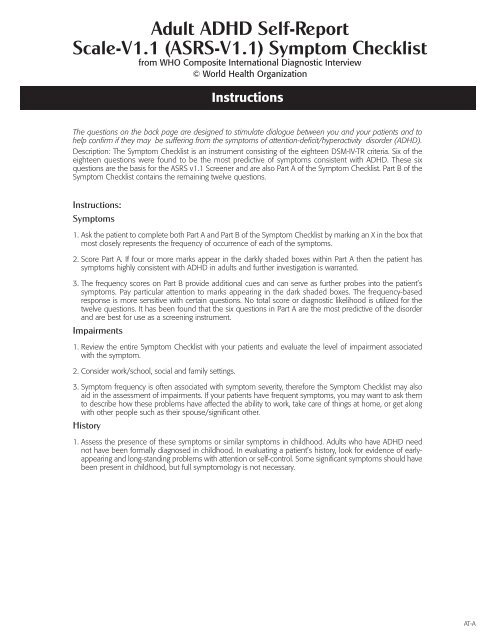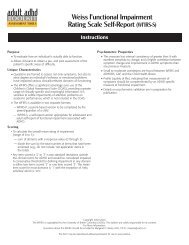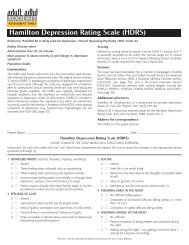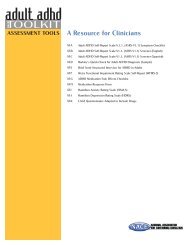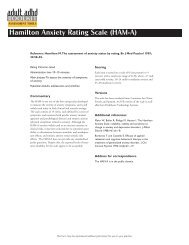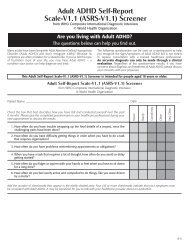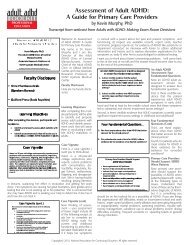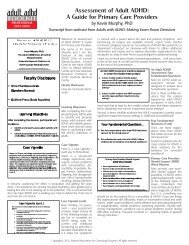Adult ADHD Self-Report Scale-V1.1 (ASRS-V1.1) Symptom Checklist
Adult ADHD Self-Report Scale-V1.1 (ASRS-V1.1) Symptom Checklist
Adult ADHD Self-Report Scale-V1.1 (ASRS-V1.1) Symptom Checklist
You also want an ePaper? Increase the reach of your titles
YUMPU automatically turns print PDFs into web optimized ePapers that Google loves.
The Value of Screening for <strong>Adult</strong>s with <strong>ADHD</strong>Research suggests that the symptoms of <strong>ADHD</strong> can persist intoadulthood, having a significant impact on the relationships, careers,and even the personal safety of patients who may suffer from it. 1-4Because this disorder is often misunderstood, many people who haveit do not receive appropriate treatment and, as a result, may neverreach their full potential. Part of the problem is that it can be difficultto diagnose, particularly in adults.The <strong>Adult</strong> <strong>ADHD</strong> <strong>Self</strong>-<strong>Report</strong> <strong>Scale</strong> (<strong>ASRS</strong> v1.1) and scoring systemwere developed in conjunction with the World Health Organization(WHO) and the Workgroup on <strong>Adult</strong> <strong>ADHD</strong>, which included thefollowing team of psychiatrists and researchers:Lenard Adler, MDAssociate Professor of Psychiatry and NeurologyNew York University Medical SchoolRonald Kessler, PhDProfessor, Department of Health Care PolicyHarvard Medical SchoolThomas Spencer, MDAssociate Professor of PsychiatryHarvard Medical SchoolAs a healthcare professional, you can use the <strong>ASRS</strong> v1.1 as a tool tohelp screen for adult <strong>ADHD</strong> patients. Insights gained through thisscreening may suggest the need for a more in-depth clinician interview.The questions in the <strong>ASRS</strong> v1.1 are consistent with DSM-IV criteria andaddress the manifestations of <strong>ADHD</strong> symptoms in adults. Content ofthe questionnaire also reflects the importance that DSM-IV places onsymptoms, impairments, and history for a correct diagnosis.The screener takes less than 5 minutes to complete and can providesupplemental information that is critical to the diagnostic process.References:1. Schweitzer, J.B., Cummins, T.K., Kant, C.A. Attention-deficit/hyperactivity disorder.Med Clin North Am. 2001;85(3):10-11, 757-777.2. Barkley, R.A. Attention deficit hyperactivity disorder: a handbook for diagnosisand treatment (2nd ed.). 1998.3. Biederman, J., Faraone, S.V., Spencer, T., Wilens, T., Norman, D., Lapey, K. A, et al.Patterns of psychiatric comorbidity, cognition, and psychosocial functioning inadults with <strong>ADHD</strong>. Am J Psychiatry. 1993:150:1792-1798.4. American Psychiatric Association. Diagnostic and statistical manual of mentaldisorders, (4th ed., text revision). Washington, DC. 2000:85-93.© World Health OrganizationThe World Health Organization (WHO) does not endorseany specific companies, products or services.


